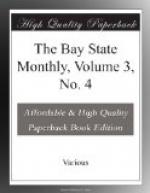After the October elections, in the autumn of 1860, had been carried by the Republicans, the election of Abraham Lincoln as President of the United States, in November, became a foregone conclusion. On the 5th day of October,—the initial day of the American Rebellion,—Governor Gist, of South Carolina, wrote a confidential circular-letter, which he despatched by special messenger to the governors of the so-called Cotton States. In this letter he requested an “interchange of opinions which he might be at liberty to submit to a consultation of the leading men” of his State. He added that South Carolina would unquestionably call a convention as soon as it was ascertained that a majority of Lincoln electors were chosen in the then pending presidential election. “If a single State secedes,” he wrote, “she will follow her. If no other State takes the lead, South Carolina will secede; in my opinion, alone, if she has any assurance that she will be soon followed by another or other States; otherwise, it is doubtful.” He asked information, and advised concerted action.
The governors of North Carolina, Alabama, Mississippi, Louisiana, and Georgia sent replies; but the discouraging tone of their responses establishes, beyond controversy, that, with the exception of South Carolina, “the Rebellion was not in any sense a popular revolution, but was a conspiracy among the prominent local office-holders and politicians, which the people neither expected nor desired, and which they were made eventually to justify and uphold by the usual arts and expedients of conspiracy.”
From the dawn of its existence the South had practically controlled the government; she very naturally wished to perpetuate her control. The extension of slavery and the creation of additional slave States was a necessary step in the scheme, and became the well-defined single issue in the presidential election, though not necessarily the primal cause of the impending civil war. For the first time in the history of the republic the ambition of the South met overwhelming defeat. In legal form and by constitutional majorities Abraham Lincoln was chosen to the presidency, and this choice meant, finally, that slavery should not be extended.
An election was held in South Carolina in the month of October, 1860, under the manipulation of the conspirators. To a Legislature chosen from the proper material, Governor Gist, on November 5th, sent a message declaring “our institutions” in danger from the “fixed majorities” of the North, and recommending the calling of a State Convention, and the purchase of arms and the material of war. This was the first official notice and proclamation of insurrection.
The morning of November 7th decided the result of the national election. From this time onward everything was adroitly managed to swell the revolutionary furor. The people of South Carolina, and especially of Charleston, indulged in a continuous holiday, amid unflagging excitement, and, while singing the Marseillaise, prepared for war! Everybody appeared to be satisfied,—the conspirators, because their schemes were progressing, and the people, because, innocently duped, they hoped for success.




